




 |
   |
 |
 |
Lynn Teeter Flower (2007, 38.25) ***/T |
|
| A Good Start Clean Getaway Smile and Wave No Stars Replay Small Part of Me Irish Goodbye My Own Fault |
The Ballad of Sean Foley Lost Time Lynn Teeter Flower |
|
Current availability:
Mellotron used:
Maria Taylor is one half of Azure Ray, who have considerable connections with Bright Eyes. As such, it comes as no great surprise that Taylor's second solo album, Lynn Teeter Flower, is a mostly melancholy effort, although it has its (relatively) jauntier moments, notably Replay and the beatbox-driven Irish Goodbye. Highlights? Possibly the gentle Clean Getaway, Smile And Wave and The Ballad Of Sean Foley, but nothing here appals.
Andy LeMaster plays 'Strawberry Fields'-esque Mellotron flutes on Smile And Wave from Ardent Studios' machine, to reasonable effect. I know of two other Taylor albums with Mellotron credits, but it seems they're both sampled.
See: Samples etc.
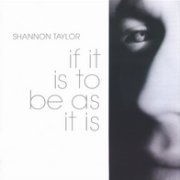 |
if it is to be as it is (2006, 37.19) ****/TTTTSurviving SundayYou Should Be Here Today Virgin Guitar Rhythm & Rhyme It Falls to Me In the Tall Grass Leaving This House Waited a Fortnight A Thousand Reasons Why |
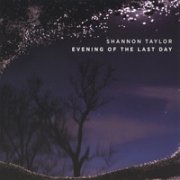 |
Evening of the Last Day (2008, 45.27) ****/TTT½ |
|
| Their Song East End A Lesson Learned Jane If I Didn't Know England Again Broken Compass West End |
Adoration I've Found Someone Evening of the Last Day |
|
Current availability:
Mellotrons used:
Shannon Taylor (once of Liberty Bros, fact fans) is one of those musicians who have had a lengthy career without ever recording very much, although it seems his intention is to change this state of affairs for the better. if it is to be as it is [sic.] is the first fruit of his labours and exceedingly good it is, too. I expected an album of introverted singer-songwriter fare (not that there's necessarily anything wrong with that), so I was taken aback by the slightly new-waveish pop of opener Surviving Sunday, although most of the rest of the album does fit the expected pigeonhole. Actually, that's not entirely true, as three of the nine tracks here are instrumentals (Virgin Guitar, In The Tall Grass and Waited A Fortnight), breaking the more song-based material up nicely, in a way very few artists would even think to do these days.
Taylor's (now defunct) website actually has a 'Mellotron' page, where he details his ownership (new in '73, one careful owner), mentioning the three tape frames in his possession and with a beautiful pro-quality pic of the machine. The album credits also list Chamberlin on most tracks, although it seems they're samples. As in so many cases where Mellotron and Chamby are both utilised, it's frequently far from easy to tell what's doing what, so Surviving Sunday features strings and cellos (?), with the latter sounding less Mellotron-like, which probably means that's what they are. Again, both instruments are involved on You Should Be Here Today, but all I can hear is regulation strings. However, Virgin Guitar is beautiful, featuring nothing but classical guitar, bass and massed Mellotron and Chamby (Marina Tishkova plays Mellotron, too), with what sounds like standard Mellotron strings, Chamby solo violin (??) and vibes from something or other. Gorgeous. Flutes on the album's second instrumental, In The Tall Grass, on top of the ubiquitous strings, while the third and last, Waited A Fortnight is to die for, despite the slightly out of tune bass. Incidentally, both It Falls To Me and A Thousand Reasons Why have no 'Mellotron' credit, although both contain Chamby samples.
Just to prove it wasn't a fluke, Shannon has repeated his feat four years later, on Evening of the Last Day. More excellent songs, in a similar vein to those on his debut, although slightly less Mellotron this time round. Best tracks are probably opener Their Song and one of the album's two instrumentals, West End; while the songwriting might fall just a tad short of the standard on Taylor's debut, it's not by enough to affect its star rating. Plenty of Shannon's M400 again, of course: Their Song opens with very full-on Mellotron strings, reiterated throughout the track, with more of the same in East End, while Jane starts with unaccompanied flutes, adding strings later on. West End has nice flute and strings parts, with strings again in the closing instrumental title track (out-of-tune Mellotron alert!) to finish things off nicely. In addition, England Again features Chamby string samples, used with far more restraint than on if it is to be as it is.
All in all, in if it is to be as it is, we're talking one of the best new Mellotron albums I've heard in quite some time and although Evening of the Last Day doesn't quite match it on the Mellotron front, it's still a damn' good record. These have no distribution as such and only a handful of online reviews, so I sincerely hope some of you will go to Shannon's site and purchase these excellent recordings. Not only are the songs, vocals and musicianship excellent, but the tape-replay usage is more than worthy of your time and all for a paltry $12.99 each including postage worldwide. Buy.
As a sad postscript, Taylor's MS finally caught up with him in early 2012. RIP, Shannon.
See: Liberty Bros
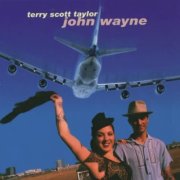 |
John Wayne (Orange Grotesques Part 1) (1998, 41.32) ***/T |
|
| Writer's Block Mr. Flutter Too Many Angels Boomtown You Told Them Exactly What I Didn't Say Big Shot & Miniature Girl Ten Gallon Hat Hey John Wayne |
Chicken Crosses the Road You Lay Down |
|
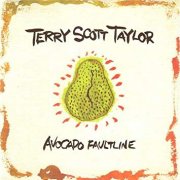 |
Avocado Faultline (2000, 39.38) ***/TT |
|
| Cowboys With Engines Startin' Monday Capistrano Beach Pie Hole The Afternoon Built Her a Cloud Angels Must Smile Like That With What I Should Have Said |
Pretend I'm Elvis (for Just One Night) Papa Danced on Olvera Street Kind Word |
|
Current availability:
Mellotrons/Chamberlin used:
Terry Scott Taylor is a founding member of acceptable CCM merchants Daniel Amos, also playing with Swirling Eddies and the Lost Dogs alongside his solo career. Ah, that Protestant work ethic, eh? 1998's John Wayne (Orange Grotesques Part 1) was his fourth solo album, a surprisingly decent pop/rock effort that isn't obviously a Christian album (hurrah!), at best on the upbeat Mr. Flutter, Too Many Angels and gentle closer You Lay Down, and its worst of the cheeso (ironic?) country of Ten Gallon Hat. Phil Madeira plays Mellotron, with cellos, flutes and strings on opener Writer's Block, although the strings on Too Many Angels are generic samples.
2000's Avocado Faultline is more of a regular Americana release, or at the folkier end of country. As with so many similar, the quality of the songs is measured more by the lyrics than the music, making Startin' Monday, The Afternoon (killer country lyric: "Oh how she loved the morning, so God took her in the afternoon") and, unsurprisingly, Pretend I'm Elvis (For Just One Night) its best tracks. Madeira on Chamberlin and Mellotron this time, with flutes on The Afternoon, background strings on Built Her A Cloud and cellos on Angels Must Smile Like That, With What I Should Have Said and closer Kind Word, although little of it's that overt.
See: Daniel Amos | Surfonic Water Revival
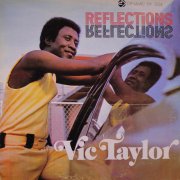 |
Reflections (1973, 35.12) **/TTT½ |
|
| Wonderful Sound Mr. Bojangles Stir it Up My Woman My Wife He Only You Till Questions and Answers |
True Love is Greater Darling Don't You Cry Last Song The Man I Used to Be |
|
Current availability:
Mellotron used:
Although considered a reggae singer, the bulk of Vic Taylor's (1947-2003) second album, 1973's Reflections, is more MOR than dread, only a handful of tracks (principally his takes on Johnny Nash's Stir It Up and Questions And Answers) being even slightly Jah. Think: slushy, pre-psych '60s lounge music and you won't be too far off the mark.
Geoffrey Chung, Leslie Butler and Neville Hinds are all credited with Mellotron ('strings/cello'), with 'orchestral replacement' strings to one degree or another on everything except Stir It Up and Only You, with cellos on My Woman My Wife and Last Song, although the flute solo on Questions And Answers sounds real. The Mellotron use is the only thing that makes this even slightly palatable, frankly.
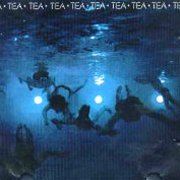 |
Tea (1974, 36.54) ***½/TCool in the MorningGlorimont Hatred or Love Surfer Hazy Colours Lady |
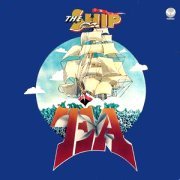 |
The Ship (1975, 40.01) ***½/TBreakdownThrough Scarlet The Ship See You Again I'd Never Have Bothered A Dog Called Joe Crystal Rivers Summer in the City |
Current availability:
Mellotrons used:
Switzerland's Tea (featuring Malta's Marc Storace, who went on to (relative) fame'n'fortune with the ridiculous Krokus) specialised in that always fairly unfashionable mixture, hard rock and prog. Their debut, 1974's Tea, is a bit of a musical no-man's land, unlike albums by some of their contemporaries, who managed to get the combination right. Saying that, it's actually a fairly decent record, if a tad unexciting, with highlights including Surfer, Glorimont and Hazy Colours. Philippe Kienholz does a sterling job on keys, mostly Hammond, although he gets a few Mellotron string chords in on Cool In The Morning and Hazy Colours, though it's hardly what you'd call essential use.
Their follow-up, '75's The Ship, carries on in a similar vein to their debut, highlights including excellent opener Breakdown, the epic title track and the lengthy I'd Never Have Bothered, although their brass-and-strings-driven version of Summer In The City (clearly an attempt to break the Swiss charts) is fairly unnecessary. Interestingly, snippets of this album sound not unlike the style Canada's Saga would make their own a few years later, although I'd be surprised to learn that they'd ever heard Tea. As before, little Mellotron from Kienholz, just brief strings parts on Breakdown and I'd Never Have Bothered.
Tea made one more album, 1976's rather less interesting and Mellotron-free Tax Exile (they should be so lucky), its occasional string parts provided by a string synth, while the 'flutes' on Just Be Yourself sound more like synth. Are their first two releases worth the effort? While both flawed, there's a great compilation waiting to be constructed from their best bits, although I wouldn't bother with either for the Mellotron.
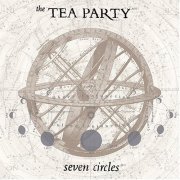 |
Seven Circles (2004, 45.11) ****/½ |
|
| Writing's on the Wall Stargazer One Step Closer Away Oceans Luxuria Overload Coming Back Again The Watcher |
Empty Glass Wishing You Would Stay Seven Circles |
|
Current availability:
Mellotron used:
The eccentrically-named The Tea Party are one of Canada's hidden delights. Forming in 1990, the trio concocted a sound consisting of roughly equal parts Led Zeppelin and The Doors, releasing an impossible-to-find independent debut the following year, their first major-label outing, Splendor Solis, following in '93. 2004's Seven Circles is their most recent album to date, the band splitting the year after its release, only reforming in 2011.
There's no such thing as a bad Tea Party album, although it's unlikely they'll ever top 1995's jaw-dropping The Edges of Twilight again, so it's slightly unfair to expect Seven Circles to reach those heady heights. Saying that, it's a fine release, not dissimilar to its immediate predecessor, 2001's The Interzone Mantras, combining the band's earlier style with the electronica they began incorporating into their sound on 1997's Transmission. Top tracks include opener Writing's On The Wall, Ocean and the typically mantric closing title track, but, as with their entire career, nothing here disappoints.
The supposed 'Mellotron' on this album's predecessor turns out to be samples, but when you hear Stuart Chatwood's string part towards the end of Wishing You Would Stay, all you can think is 'real Mellotron'. Well, I can, anyway. It seems that some of the album was recorded at legendary producer Bob Rock's Hawaiian hideout; Rock apparently owns two M400s, though it's unknown if that's what we're hearing here. Frankly, a few seconds of probable Mellotron is no reason to buy this album; its superb penmanship and massive sound are. The band's reformation is one of the year's good news stories at Planet Mellotron Towers; the chances of them crossing the Atlantic any time soon are low, but we can hope, can't we?
See: Samples etc.
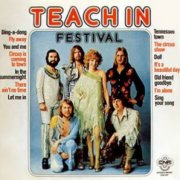 |
Festival (1975, 39.33) *½/T |
|
| The Circus Show In the Summernight There Ain't No Time I'm Alone Let Me in It's a Beautiful Day Tennessee Town Ding-a-Dong |
Sing Your Song The Circus is Coming to Town Old Friend Goodbye Doll You and Me Fly Away |
|
Current availability:
Mellotron used:
Oddly enough, I'd never (knowingly) heard of Teach in before I came across this album, although when track eight came on, it sounded horribly familiar. Turns out Ding-A-Dong won the 1975 Eurovision Song Contest (non-European readers can probably switch off right here) and was a hit throughout Europe, leading to my vestigial memory of it from over thirty years ago. And it sounds like...? A bloody Eurovision winner, that's what. Aside from Abba's fab Waterloo, which won the previous year, just about every Eurovision entry ever has been the schlockiest old pile of shite you can imagine and Ding-A-bleeding-Dong is no exception. To no-one's surprise whatsoever, its parent album, Festival, is pretty much as bad throughout. Most of it's the same kind of cheery, cheesy nonsense as the hit, although Tennessee Town and You And Me are crummy sub-Abba glam-rock-lite, with a few ballads scattered across the album to show their 'versatility', no doubt.
Bassist John Gaasbeek doubles on keys, including credited Mellotron, which turns up on It's A Beautiful Day, with a remarkably good flute part that almost fools the ear into thinking it's real. All in all, then, an absolute horror, with a few unintentionally amusing moments, but seriously, nothing you can't live without. Believe me. To my great surprise, though, one reasonable Mellotron track, although the music's rubbish. Incidentally, a twelve-track version of the album was released the same year, retitled Ding-a-Dong, one of the two deleted tracks being It's A Beautiful Day. Genius. For what it's worth (which isn't a lot), there were at least two other Teach in albums, '77's See the Sun (Kayak reference? Seriously?) and '79's eponymous effort, almost unrecognisable as being by the same band. This lot followed trends; I suspect setting them was way beyond their capabilities.
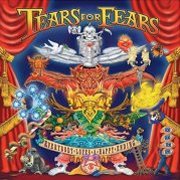 |
Everybody Loves a Happy Ending (2004, 54.42) ***½/TT½ |
|
| Everybody Loves a Happy Ending Closest Thing to Heaven Call Me Mellow Size of Sorrow Who Killed Tangerine? Quiet Ones Who You Are Devil |
Secret World Killing With Kindness Ladybird Last Days on Earth |
|
Current availability:
Mellotrons used:
Tears for Fears' reformation album, Everybody Loves a Happy Ending, is vastly better than I'd expected, with little of their '80s pomp, despite being immaculately produced. Actually, what they've done is taken the late-'60s Beatles influence they displayed so proudly on Sowing the Seeds of Love (remember those horns? Allegedly sampled directly from the Beatles' multitrack, such as it is) and run with it, combining it with their already finely-honed pop sensibilities (that isn't meant to sound sarcastic, incidentally). Roland Orzabel's voice is as smooth as ever, love it or loathe it and, overall, I have to say they've produced a well-crafted, melodic pop album without straying into 'irritating' territory.
I have it on good authority that two M400s were used during the recording (though none were harmed), although it's not always so easy to spot where they were used, so the highlighting above is, er, 'far from definitive'. Sounds like heavily-processed strings on the opening title track, with more of the same and cellos on Closest Thing To Heaven. Flutes on Call Me Mellow, quite recognisable strings on Size Of Sorrow and similarly overt flutes and strings on Who You Are. Raucous cellos, including those low double bass notes on Devil and probably the most upfront part on the album on Killing With Kindness, with background strings overlaid with extremely in-yer-face flutes. All in all, Mellotron on most tracks and I could easily have missed some in the dense mix; a (relative) triumph of Mellotronness, gentlemen.
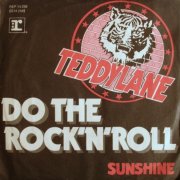 |
7" (1973) **½/T½ Do the Rock'n'Roll Sunshine |
 |
7" (1973) ***/T½ Bye Bye Love Heart Break |
Current availability:
Mellotrons used:
Teddylane? Seemingly a short-lived project featuring Shoes singer Theo van Es, who released two singles in 1973, then promptly disappeared. Do The Rock'n'Roll sounds exactly as you'd expect, its flip, Sunshine, being a rather silly glam-era ballad, while Bye Bye Love sounds like Summer In The City played on a MiniMoog, backed with Heart Break, another glammy effort, at the rock'n'roll end of hard rock-lite.
Mellotron (player unknown) on two of the band's four-track legacy, with chordal strings all over Sunshine and Bye Bye Love; hardly essential listening, but nice to hear on a pair of period singles. To my knowledge, these aren't available in any regular form, but may be on bootlegs.
See: Shoes
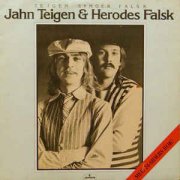 |
Teigen Synger Falsk [as Jahn Teigen & Herodes Falsk] (1975, 37.35) **/½ |
|
| Intro En Intro To O Sole Mio Ostebutikken Hvem er Dette? Diskusjon Lykkedalen Pengesangen |
N. Elgh Jeg Påstår Reisebyrå Outro |
|
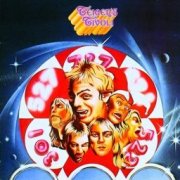 |
Teigen's Tivoli (1977, 43.15) **½/TT½ |
|
| Tivoli Smiles Spectator 2 FZ Rock'n'Roll Grandmother Is Everybody a Teacher Tired of Hoping to Hope Amen |
The Band Stopped to Play Stolen From Time Close Together San Fransisco Morning Into the Sun After the End (1st and 2nd Movements) |
|
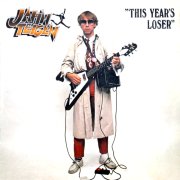 |
This Year's Loser (1978, 33.29) **½/½ |
|
| Shock Treatment On the Tip of My Tongue They Don't Clap Losers Wheel of Love Mile After Mile I'll Give it Up Join the Clowns Back in Paris |
Sack That Jaques Still My Mother's Child |
|
Current availability:
Mellotrons used:
Although a major star in his native Norway, the only thing Ja(h)n Teigen (1949-2020) means around these parts is as vocalist for the Norwegian Popol Vuh (later Popol Ace), which he followed with a very mainstream career, including representing his country no fewer than three times in the Eurovision Song Contest. His first work outside the band was a collaboration with Kim "Herodes Falsk" Hansen, a Norwegian-language comedy album, its sleeve containing a 'special thanks' to the members of Monty Python's Flyvende Sirkus. If you understand Norwegian, perhaps this actually manages to channel Python - N. Elgh is clearly a straight translation of their Ann Elk sketch - although I doubt it, its mix of spoken-word sketches and pseudo-oompah music falling terribly flat a few decades later. It's hardly surprising this is long out of print. Most audacious rip-off? Intro To shamelessly rips The Bonzos' The Intro And The Outro, possibly word-for-word (I can't be bothered to check). Mellotron? Teigen adds some background strings to O Sole Mio, which is exactly what you think it is, to no real effect. Not only pointless, but pointless and unoriginal.
1977's Teigen's Tivoli is his first solo effort proper, largely consisting of undistinguished mainstream pop of the era, although closer After The End (1st And 2nd Movements) is a pseudo-prog effort, as you might expect. Teigen and Alf Emil Eik both play Mellotron, with stabbed choir chords on opener Tivoli, a male voice line on Is Everybody A Teacher and major choir parts on Amen and After The End, plus flutes on Stolen From Time (not from Popol's album of the same name) and San Fransisco Morning, although the strings on a few tracks are clearly string synth. The following year's This Year's Loser is even more mainstream than its predecessor, at its least tedious on the white reggae of They Don't Clap Losers, the CD-only Break It Up and I'll Give It Up. Teigen plays uncredited Mellotron, with a background strings/cello octave part on Join The Clowns.
See: Popol Vuh
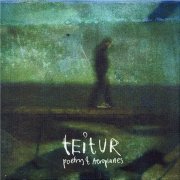 |
Poetry & Aeroplanes (2003, 38.10) ***/T½ |
|
| Sleeping With The Lights on I Was Just Thinking You're the Ocean Poetry and Aeroplanes Josephine One and Only Rough Around the Edges Let's Go Dancing |
Amanda's Dream Shade of a Shadow To Meet You |
|
Current availability:
Chamberlin used:
Maybe surprisingly, Teitur Lassen isn't the only musician from the tiny Faroe Islands known to the outside world; Wikipedia lists a good dozen composers, bands and solo artists, which isn't bad for an isolated dot a long way from anywhere in the North Atlantic with a population slightly under fifty thousand. Well, now I've comprehensively patronised his home country, I can tell you that Teitur is a pretty ordinary modern singer-songwriter, whose style is universal enough to get his music used in several film soundtracks to date, which isn't necessarily a compliment, at least from me. 2003's Poetry & Aeroplanes is his first album and while perfectly acceptable, does little of any particular interest, unless you really have a yen to hear even more wishy-washy stuff from sensitive young men. Oh well, it's vastly better than James Blunt, anyway.
Patrick Warren does his usual Chamberlin thing (no, of course he didn't travel to the Faroes, the album was recorded in the States), with upfront flutes and strings on opener Sleeping With The Lights On and lesser string parts on Josephine and closer To Meet You, but as so often with this instrument, nothing that startling. Overall, yet another album that starts OK, then palls quickly, despite its sensibly short length. One decent Chamby track, but nowhere near enough to make this worth the effort on that account.
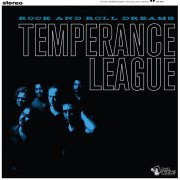 |
Rock & Roll Dreams (2013, 31.01) ***½/T½ |
|
| Rock and Roll Dreams Unrelenting The Hunger Are You Still With Me? Now I Understand Too Much Time Lost Are You Ready? |
(That, You Can) Count on Don't Say Goodbye Everybody Dreams |
|
Current availability:
Chamberlin used:
North Carolina's Temperance League are a new powerpop outfit, consisting of six gentlemen who have probably been around the block a few times and aren't letting it worry them in the slightest. 2013's Rock & Roll Dreams was their debut, much 12-string in evidence; I think the sleeve design gives their influences away better than any description I could give you. Highlights? Everything on this half-hour album's worth hearing, possibly on its best on Unrelenting, Are You Still With Me? and Spectoresque closer Everybody Dreams.
Shawn Lynch plays Fidelitorium Studios' Chamberlin, with strings all over the opening title track, a string-sectionesque part on Too Much Time and beautifully-arranged strings on Everybody Dreams. Why can't more albums sound like this? Recommended.
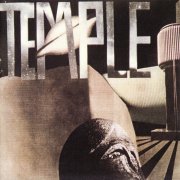 |
Temple (1976, 32.04) ***/T½HeathenLeaves Are Falling/Black Light Age of Ages Ship on Fire Crazy Hat/Kingdom of Gabriel |
Current availability:
Mellotron used:
Temple's self-titled 1976 album is one of three German oddities from the era all originally released on the Pyramid label and all reissued by Psi-Fi, along with the even more obscure Pyramid. Unlike Pyramid, though, Temple is nearer to that much-misused genre term, Krautrock, than anything especially proggy; most of the album consists of chugging space-rock with effected vocals, the whole overlaid with synths. Er, this IS space-rock, isn't it?
The inimitable Zeus B. Held (Birthcontrol) plays Mellotron, with strangely muted string parts on Leaves Are Falling/Black Light, my personal favourite (and the least space-rock) of the album's jams, er, songs and the latter part of Crazy Hat/Kingdom Of Gabriel. This is a long way from being a classic, but space-rock fans who've run out of rubbish-quality live Hawkwind albums on which to waste their hard-earned might consider giving it a blast.
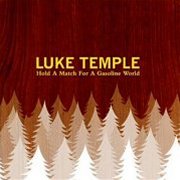 |
Hold a Match for a Gasoline World (2004, 49.09) ***/TT½ |
|
| Someone, Somewhere Make Right With You In the End Mr. Disgrace Radiation Blues Old New York Private Shipwreck To All My Good Friends, Goodbye |
Get Deep, Get Close Blue Britches Only a Ghost [Untitled] |
|
Current availability:
Mellotron used:
Luke Temple runs a solo career concurrently with his membership of indie types Here We Go Magic, 2004's Hold a Match for a Gasoline World being his solo debut. It's probably not the most dynamic singer-songwriter effort you'll ever hear, shifting between rather blandly jaunty openers Someone, Somewhere and Make Right With You, the countryish To All My Good Friends, Goodbye and several folk-rock efforts, at its best when keys/wind instrument man Rob Stillman adds clarinet arrangements, notably on the offbeat Blue Britches.
Stillman adds Mellotron to a handful of tracks, with flutes (alongside real clarinet) on Mr. Disgrace and Blue Britches, strings and flutes on Radiation Blues and flutes on Private Shipwreck, authentically choking off at the end, although the album's Mellotronic highlight is the final, untitled track, a solo flute piece that proves the instrument's veracity with aplomb. Worth hearing? Only if you like your singer-songwriters on the light side, although that final track is worth the effort.
 |
Rize of the Fenix (2012, 41.30) *½/½ |
|
| Rize of the Fenix Low Hangin' Fruit Classical Teacher Señorita Deth Starr Roadie Flutes & Trombones |
The Ballad of Hollywood Jack and the Rage Kage Throw Down Rock is Dead They Fucked Our Asses To Be the Best 39 |
|
Current availability:
Mellotrons used:
I hate Jack Black. There, I've said it. Why, make that WHY, does anyone think this mugging idiot is in any remote way amusing? And as for that thing he does with his eyebrow... I'm not sure if Tenacious D (a basketball term, apparently) is the worst thing he's ever done, but it must run it close. I mean, an acoustic guitar-playing duo pretending to be Metal Gods. Funny? If you're stoned out of your gourd, or thirteen (or both), it's probably, like, the funniest thing ever, dude, but the resulting crapulent, frat-boy drivel really is for those whose sense of humour has yet to develop past, er, make that simply 'yet to develop'.
2012's Rize of the Fenix (clearly some kind of in-joke) is every bit as dreadful as anyone who's heard anything else by the gruesome twosome might expect, lowlights including Deth Starr, Roadie and They Fucked Our Asses, while skits Classical Teacher and Flutes & Trombones are thoroughly puerile. I reckon Black must utter 'fuck' in every sorry excuse for a song, usually multiple times, which is, like, really funny, y'know? Have I had a sense of humour bypass? Some may think so; I prefer to believe that I like things at least a little more sophisticated than this, working on the theory that it'd be difficult to be a lot less.
Mellotron? It's on two tracks from two different players: John Kimbrough (Walt Mink) adds, er, what? FX? Exceedingly distant strings? Something, anyway, to Señorita, while Jon Brion adds a brief string part to The Ballad Of Hollywood Jack And The Rage Kage, for what it's worth, which isn't much. Miserable bastard? That's me. Y'know what? There's plenty of great comedy around, from Woody Allen's '60s standup through Python and other absurdists, so why bother with nineteenth-rate crap like this? I expect the joke's on me for not laughing along, but I'm not sure I care. Avoid.
 |
7" (1968) ***/T Tennessee Bird Walk Tennessee Toddy |
 |
Spanish Gold (1972, 27.23) ***/TT |
|
| In a Little Spanish Town La Paloma Que Sera Sera (Whatever Will Be, Will Be) Maria Elena Cielito Lindo Pepito The Lonely Bull Guantanamera |
Nuevo Laredo Vaya Con Dios Perfidia |
|
Current availability:
Chamberlins used:
Nashville's Tennessee Guitars were a fairly obscure, quite anonymous instrumental act, almost certainly consisting of Nashville session dudes, who released a handful of 7"s and LPs from the late '60s to 1980. A 1968 single, Tennessee Bird Walk c/w Tennessee Toddy showcases two sides of the band, a cheesy guitar instrumental backed with a pretty decent electric blues, featuring a Chamberlin string line on the 'A' from an unknown player.
Fast-forward four years to '72's Spanish Gold, a short set of semi-familiar tunes played in the band's inimitable style, with extra added mariachi brass, probably at its best on Maria Elena and Guantanamera. Again, an unknown player plays Chamberlin, bunching all the tracks together towards the end, with chordal and/or solo string parts on The Lonely Bull, Guantanamera, Nuevo Laredo and Vaya Con Dios.
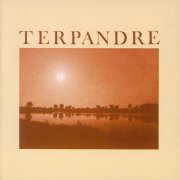 |
Terpandre (1981, 36.44/49.51) ****/TTTT½Le TempsConte en Vert Anne-Michaële Histoire d'un Pêcheur Carrousel [CD adds: Conte en Vert (live) Musique Pour Clair Obscur (live)] |
Current availability:
Mellotron used:
Terpandre coalesced from various other bands in the mid-'70s in Lyon, France, taking their name from ancient Greek mythology. So should it be pronounced in the French manner, or as it would be said in English? An instrumental five-piece, with a violinist added for the album, Terpandre's sound was lush symphonic progressive rock, with influences from the Romantic period and jazz, amongst others. Surprisingly, this combination works really well, although the album may be a touch too 'sweet' for some listeners' tastes. Think 'a French version of their UK contemporaries The Enid with some extra added jazz' and you won't fall too far short of the mark. Terpandre was recorded in 1978, but the band fell foul of the usual late-'70s punk/disco-related problems, splitting up the following year, belatedly releasing the album on a small local label, Dionysos, in 1981.
Although the CD sleeve notes only list Mellotron players for four of the disc's seven tracks, it's quite clearly all over the album, mostly strings and flutes, but with some nice cello on one song. Both keyboard players (Jacques Pina and Michel Tardieu) play it on different tracks, along with acoustic and electric pianos and a little synth. Highlights are the reedy flutes on Conte En Vert and Anne-Michaële is a particularly nice piece, as is the epic Carrousel. The live tracks added to the CD show how well the band used the instrument on stage; it's a pity more of this material hasn't subsequently surfaced. As the CD's only fifty minutes long, maybe the other tracks aren't of releasable quality. Shame.
So, another little-known classic of late-'70s French prog, along with Shylock and Asia Minor, as well as the better-known Pulsar. Much of the music is very laid-back and melodic, but I can recommend it highly to both prog fans and Mellotron nuts. Buy.
 |
Melody & Menace (1982, 35.31) ****/TT½Black TieCreature of Habit Passages Afterlife Threnody Noise and Haste Old Friends Dry Leaves in the Wind Coventry |
Current availability:
Mellotron used:
Terraced Garden were unusual in being a non-Japanese symphonic progressive band in the '80s. Starting as guitarist/keyboard player/vocalist Carl Tafel's solo project, they morphed into a proper band after 1982's Melody & Menace, playing the album's songs live, plus others which, sadly, were never recorded. The band's style was an interesting mixture of gentle, pastoral material (Passages) and almost punky, complex stuff (Threnody), with Tafel's Fripp-like guitar work to the fore. Songs were generally quite compact (by prog standards; we're not talking two-minute efforts here), compressing plenty of ideas into fairly short spaces, though not in a contrived, pseudo-commercial kind of way. Hard to pick out highlights, although Afterlife managed to combine both the band's styles successfully, while Passages is probably the peak of the pastoral part of their style, although Coventry is the track that make me sit up and listen properly.
Tafel's Mellotron use isn't the most major you're ever going to hear (I have no idea if the machine was his; he never used it again), with rather unassuming strings on opener Black Tie, although his parts on Afterlife and Old Friends are more upfront. A faint choir part on Dry Leaves In The Wind paves the way for some great stuff on Coventry, finishing the album off nicely. Terraced Garden carried on to release '84's Braille and '88's Within, by which time their star was on the wane, although it's still not a bad album. I'd have to play all three back to back to determine which is best, though it's quite possible it's Melody & Menace; it's certainly the only one with any Mellotron, not that that should influence my decision (yeah, right). You're not going to find this that easily, but it's worth tracking down. CD release, please.